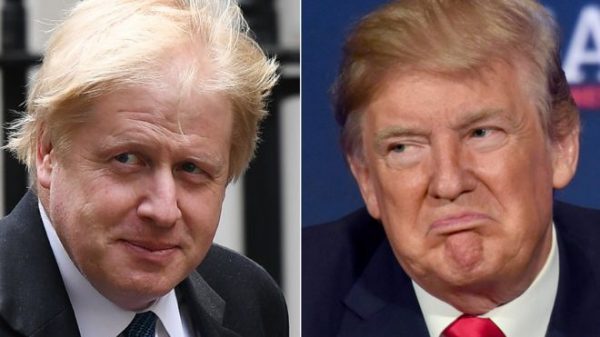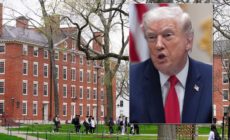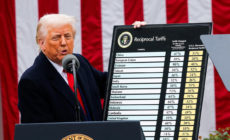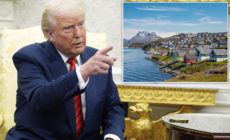Iran nuclear deal: UK Foreign Secretary tells Trump ‘don’t walk away’
- Posted on
- Comment
 UK Foreign Secretary Boris Johnson has urged President Donald Trump not to abandon the Iran nuclear deal, saying “it would be a mistake to walk away”.
UK Foreign Secretary Boris Johnson has urged President Donald Trump not to abandon the Iran nuclear deal, saying “it would be a mistake to walk away”.
Mr Johnson is in Washington to persuade the US to remain in the international accord, which saw Iran agree to limit its nuclear activities in return for the easing of economic sanctions.
The UK and its European allies have until 12 May to convince Mr Trump to stick with the agreement.
Mr Trump has called the deal “insane”.
Britain, France and Germany have been working behind the scenes for weeks in an effort to preserve the deal, which was orchestrated under the Obama administration, and includes Russia and China as signatories.
What has Mr Johnson said?
Writing in the New York Times, he argued that “only Iran would gain” from abandoning nuclear restrictions.
“Of all the options we have for ensuring that Iran never gets a nuclear weapon, this pact offers the fewest disadvantages,” he wrote.
Mr Johnson said the deal “has weaknesses, certainly, but I am convinced they can be remedied”, adding that the UK was working with the US, France and Germany to achieve that.
He said the deal had put restrictions on Iran’s nuclear programme and “now that these handcuffs are in place, I see no possible advantage in casting them aside”, adding that the handcuffs should be improved, not broken.
UK ambassador to the US, Kim Darroch, told US media: “We think that we can find some language, produce some action that meets the president’s concerns.”
While in Washington, Mr Johnson will meet US Vice-President Mike Pence, National Security Adviser John Bolton and foreign policy leaders in Congress.
He will not meet President Trump, but is expected to appear on the Fox & Friends morning news, which Mr Trump is known to watch avidly.
Why are there differences among the allies?
Mr Trump has called the deal the “worst ever” and has threatened to withdraw unless the signatories agree to fix its “disastrous flaws”.
He believes the terms are too lenient, in particular that the deal only limits Iran’s nuclear activities for a fixed period and fails to stop the development of ballistic missiles.
He also said it had handed Iran a $100bn (£72bn) windfall that it used “as a slush fund for weapons, terror, and oppression” across the Middle East.
US Secretary of State Mike Pompeo said the nuclear deal had been “built on lies”, after Israel revealed “secret nuclear files” accusing Iran of having run a secret nuclear weapons programme that was reportedly mothballed 15 years ago.
German Chancellor Angela Merkel, French President Emmanuel Macron and UN Secretary General Antonio Gutterres have all warned Mr Trump not to walk away from the deal.
Mr Macron said he agreed the deal should have wider terms and address some of Mr Trump’s concerns. He also said the feared Mr Trump would pull out.
Mr Trump must decide by 12 May whether to renew the waiver on sanctions, and has a wide range of options on whether to re-impose them.
What has Iran said?
President Hassan Rouhani said the US would face “historic regret” if it pulled out.
In remarks carried live on state television, he said Iran had “a plan to counter any decision Trump may take and we will confront it”.
He added: “Today all [of Iran’s] political factions, whether they be from the right, the left, the conservatives, reformers and moderates are united.”
Iran has said the documents produced by Israel were a rehash of old allegations already dealt with by the UN’s nuclear watchdog.
What is the Iran deal?
In 2015 Tehran signed a deal with the US, China, Russia, Germany, France and Britain agreeing to limit its nuclear activities in return for the lifting of crippling economic sanctions.
Under the deal, officially known as the Joint Comprehensive Plan of Action (JCPOA), Iran is committed to slashing the number of its centrifuges, which are machines used to enrich uranium.
It is also meant to cut its stockpile of enriched uranium drastically and not enrich remaining uranium to the level needed to produce nuclear weapons.
The number of centrifuges installed at Iran’s Natanz and Fordo sites was cut drastically soon after the deal while tonnes of low-enriched uranium were shipped to Russia.
Furthermore, monitors from the IAEA have been able to carry out snap inspections at Iranian nuclear sites.
-BBC










 (Selorm) |
(Selorm) |  (Nana Kwesi)
(Nana Kwesi)